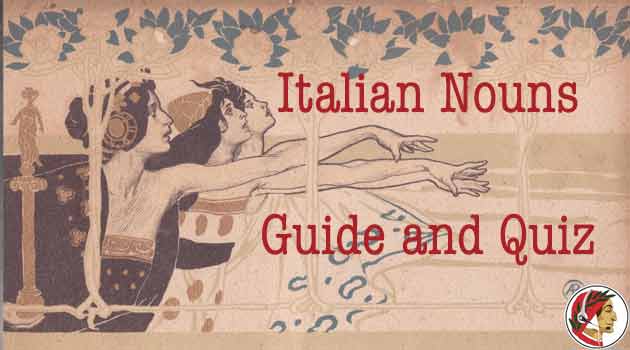Italian nouns, called sostantivi, are important elements of our language. Learn basic rules, patterns and practice with a quiz
Italian nouns are a variable part of a sentence, meaning that they can be masculine, feminine, singular or plural, according to the object they describe.
Nomi Propri
They are literally the “name” of a person or a place. We need a capital letter.
- Luigi è un bravo ragazzo.
- Andiamo a Roma?
- Il fiume Po è il più lungo d’Italia.
Nomi Comuni
They describe people or things. We can subdivide this large family of words in three groups:
Nomi Concreti, describing tangible objects:
- Ho comprato un telefonino nuovo.
- Oggi c’è un sole bellissimo!
- Da piccolo avevo una vecchia bicicletta scassata.
Nomi Astratti, describing intangible objects:
- Ci vuole pazienza per imparare l’inglese.
- Non capisco il perché di tanta fretta.
- Il futuro è incerto.
Nomi Collettivi, singular and plural nouns describing a group of objects or people:
- Il pubblico al concerto era festante.
- Passando per la campagna, abbiamo visto un gregge di pecore.
- Le stoviglie vanno lavate subito dopo il pranzo.
Structure of Italian nouns
Looking at the structure of Italian nouns, we can identify four groups:
- Nomi primitivi – They are “root” nouns, from which other sostantivi come (also adjectives verbs and adverbs, not in the scope of this blog). For example, the word terra, earth, doesn’t come from another Italian word.
- Nomi derivati – When we add a prefix or a suffix to primitive nouns or adjectives, we get other words, in our case other nouns. Terra → terreno, territorio, conterraneo etc.
Down below are two incomplete lists of prefixes and suffixes. Italian is obviously influenced by Latin and Greek, so many of the words you will see here are familiar to English speakers. I have omitted many Greek and Latin specific suffixes and prefixes of common use (psico-, meta-, eno-, -teca, -logia etc…). If you are interested to know more, click on the Wikipedia links.
Flip your phone horizontally.
Common prefixes
| PREFISSO | SIGNIFICATO | ESEMPIO |
|---|---|---|
| a-, ad-, ac- | direction, purpose | adattatore |
| a-, an- (greek) | without, not | anarchico |
| ab-, as- | far | assenteista |
| ambi- | both | ambivalenza |
| ante-, anti- | before | antenato |
| anti- (greek) | against | anticorpo |
| arci- | superlative | arcivescovo |
| bi-, bis- | two, twice | bisnonno |
| circo-, circum- | around | circondario |
| con-, com-, co- | with | coinquilino |
| contra-, contro- | opposite | contrordine |
| de-, di-, dis- | without, opposite, far | disadattato |
| extra-, estra-, stra- | much, out of | extracomunitario |
| in- im-, ir- | not, inside, make / become | impotenza |
| inter- | between | interferenza |
| intra-, intro- | inside | introspezione |
| iper- | over | ipertensione |
| ipo- | below | ipotesi |
| mis- | not | miscredente |
| oltre-, ultra- | beyond | ultrasuoni |
| pre-, pro- | before | prefisso |
| proto- | before | prototipo |
| re-, ri- | again | Rinascimento |
| retro- | back | retromarcia |
| sub-, sotto-, so-, som- | under | sommergibile |
| super-, sovra- | up, over | superconduttore |
| trans-, tras-, tra- | beyond, through | trasporto |
| ultra- | much, beyond | ultrasuoni |
Common suffixes
| SUFFISSO | FUNZIONE | ESEMPIO |
|---|---|---|
| -aggine | quality | testardaggine |
| -aggio | action | monitoraggio |
| -aglia | group | boscaglia |
| -aia | group, place | legnaia |
| -aio | activity, place | notaio, pollaio |
| -aiolo | activity | boscaiolo |
| -ame | group | fogliame |
| -ano | activity | guardiano |
| -ante, -ente | activity | cantante, tenente |
| -anza, -enza | quality, action | importanza, penitenza |
| -ario | activity, group, tool | veterinario, schedario, lampadario |
| -ato | group, place | caseggiato, commissariato |
| -eria | quality, place | galanteria, pizzeria |
| -esca | group | scolaresca |
| -esimo, -ismo | doctrine | cristianesimo – socialismo |
| -eta, -eto | group | pineta, frutteto |
| -età | quality | sobrietà |
| -fice | activity | orefice |
| -iere | activity, container | cameriere, candeliere |
| -igia | quality | ingordigia |
| -ile | container | fienile |
| -ione | action | collisione |
| -ista | activity | collezionista |
| -itudine | quality | solitudine |
| -mento | action, group | movimento, reggimento |
| -oio | instrument, place | rasoio, mattatoio |
| -olaio | activity | calzolaio |
| -ore | activity | attore, genitore |
| -ura | action, group, place | rottura, pianura |
| -uta | action | bevuta |
| -vendolo | activity | fruttivendolo |
- Nomi alterati – We can change the meaning of a noun by adding a suffix.
— diminutivo (makes it small) —> (-ino, -etto, -icciolo, -ello) —> ragazzino
— vezzeggiativo (makes it cute) —> (-uccio, otto, -olo, -ino, -etto) —> ragazzetto
— accrescitivo (makes it big) —> (-one) —> ragazzone
— dispregiativo (makes it bad) —> (-accio, -uncolo, -astro) —> ragazzaccio
- Nomi composti – this is a large family of nouns made of two words. In this case it is important to follow some basic rules on how we build their plural. That’s pretty messy and Italians often make mistakes, so don’t worry too much about it. In detail:
** nuon + noun
If the word is made of nouns having the same gender, we change the final noun.
Arcobaleno —-> Arcobaleni
If the word is made of nouns having a different gender, we change the first noun.
Pescespada —> Pescispada
** noun + adjective
In this case, they both change.
Cassaforte —> Casseforti
** adjective + noun
Change just the ending.
Altopiano —> Altopiani
** adjective + adjective
Change just the ending.
Chiaroscuro —> Chiaroscuri
** verb + noun
This one is rather difficult. If the noun is plural or feminine, the plural is invariable.
Il portacenere —> I portacenere
L’asciugacapelli —> Gli asciugacapelli
If the noun is masculine, the plural changes accordingly.
Il copriletto —> I copriletti
** verb + verb
Those are invariable.
Il dormiveglia —> I dormiveglia
There are so many exceptions that I decided to not include them in this blog. For example, the plural of pomodoro can be pomodori (the most used) but also pomidoro and pomidori. Forget about it.
A last note on foreign words that are now part of the Italian vocabulary. They all have an invariable plural. For example, we say un computer, due computer; un manager, due manager.
This includes Latin. There are of course many Latin words as part of the Italian language, but we should consider Latin as a sort of “foreign” language. The plural of referendum is therefore referendum and not referenda; the plural of auditorium isn’t auditoria. It’s common to use Curricula as plural of Curriculum (resume) even though it’s wrong.
I hope you will find this useful in future. Please solve the quiz. Alla prossima!
LOADING QUIZ…
NOVISSIMA. Albo d’arti e lettere 1902 copertina – Edoardo De Fonseca1902







